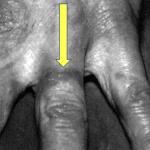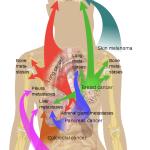Disease
The media usually report COVID data regarding recent changes in daily cases and deaths (typically single-digit percentages) or cumulative counts for the U.S. or globally (typically millions).
I say I died because I stopped breathing, and while they do not issue temporary death certificates, how else might we explain the next five minutes of which I have no remembrance?
This problem was recognized in 2021 when 27 states embarked on various incentive programs to increase public participation.
Grey's Anatomy is an awful program.
OK, that title is a bit overblown, but it's also correct. Sort of. Although incredibly rare, decades ago a small number of people had their fingers chopped off because they were wearing wedding rings.
The research used our old friend, the UK Biobank, a repository of genetic information on a large number of Brits, as well as a similar genetic registry in Finland, the FinnGen.
We aim to examine these pandemic trends holistically, recognizing that events on successive dates may not be entirely independent.
Unlike stopping a pathogen with an antibiotic or antiviral drug, a process that is simple and well-understood, getting a handle on the seemingly impossible complexity of cancer cannot be more different.












